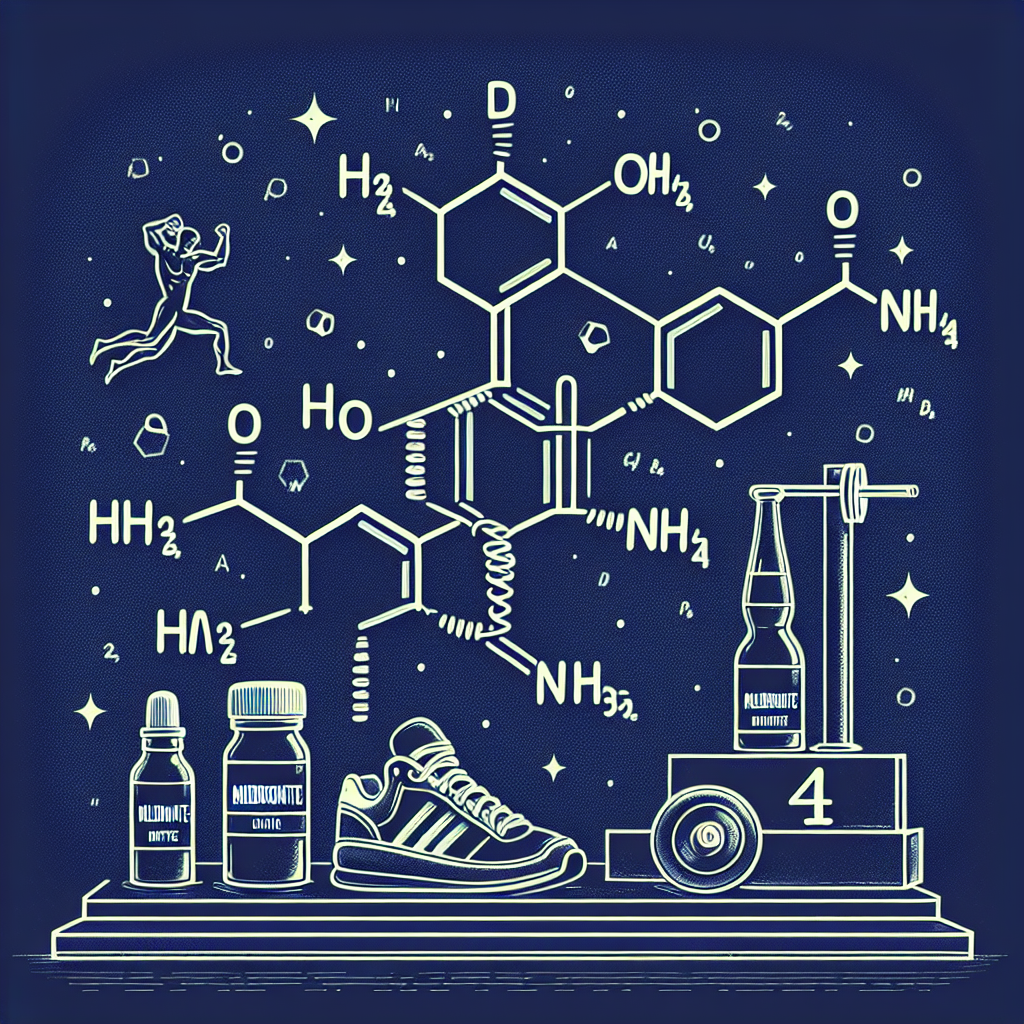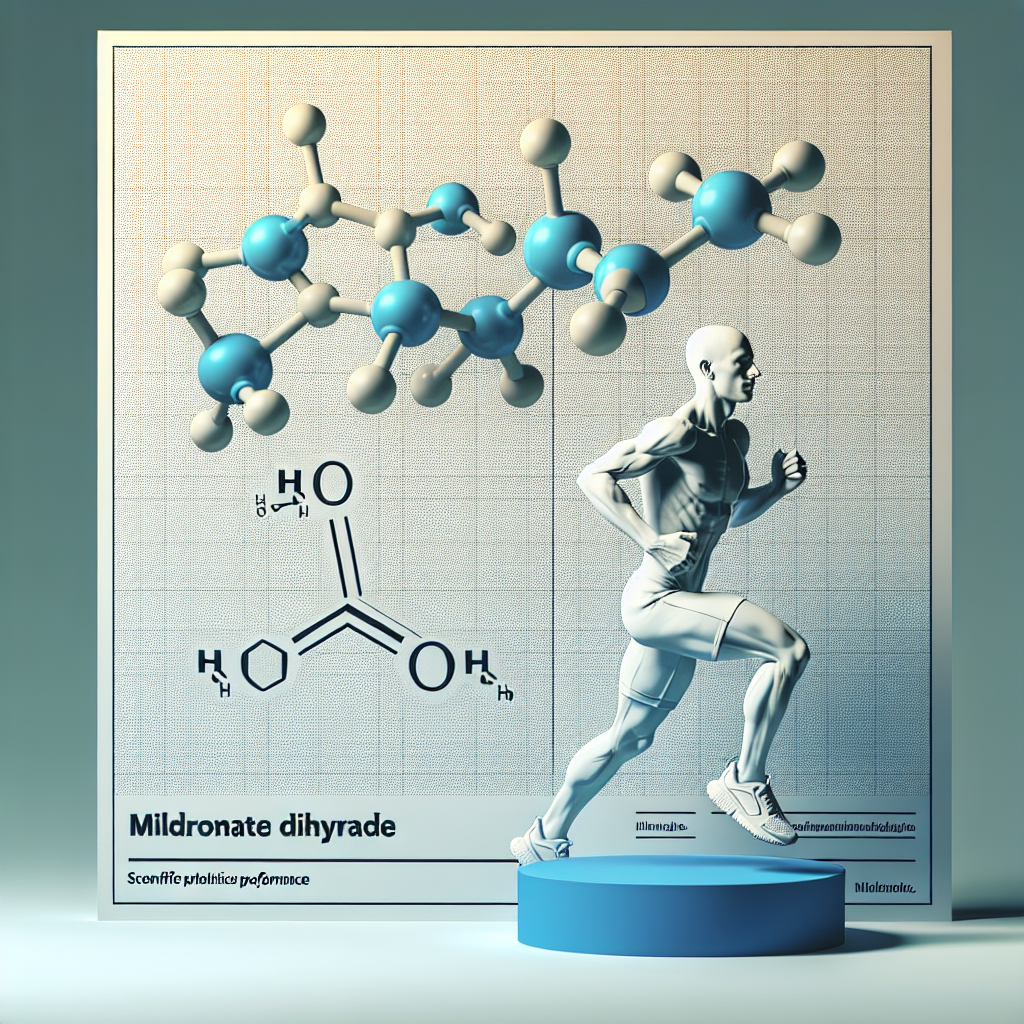-
Table of Contents
Mildronate dihydrate: a powerful ally for athletes
Athletes are constantly seeking ways to improve their performance and gain a competitive edge. From rigorous training regimens to specialized diets, athletes are always looking for that extra boost to help them reach their full potential. One substance that has gained attention in the world of sports is Mildronate dihydrate, also known as Meldonium. This drug has been touted as a powerful ally for athletes, with claims of increased endurance, improved recovery, and enhanced mental focus. In this article, we will explore the pharmacokinetics and pharmacodynamics of Mildronate dihydrate and examine its potential benefits for athletes.
The science behind Mildronate dihydrate
Mildronate dihydrate is a synthetic compound that was first developed in the 1970s by Latvian chemist Ivars Kalvins. It was initially used to treat patients with heart conditions, as it was found to improve blood flow and oxygen delivery to the heart. However, in recent years, it has gained popularity among athletes due to its potential performance-enhancing effects.
The main mechanism of action of Mildronate dihydrate is its ability to inhibit the enzyme gamma-butyrobetaine hydroxylase, which is involved in the synthesis of carnitine. Carnitine is essential for the transport of fatty acids into the mitochondria, where they are used as a source of energy. By inhibiting this enzyme, Mildronate dihydrate increases the levels of carnitine in the body, leading to improved energy production and utilization.
Additionally, Mildronate dihydrate has been shown to have antioxidant properties, which can help protect cells from damage caused by oxidative stress. This is particularly beneficial for athletes who engage in intense physical activity, as it can help reduce muscle fatigue and improve recovery.
The benefits for athletes
One of the main reasons why Mildronate dihydrate has gained popularity among athletes is its potential to improve endurance. Studies have shown that this drug can increase the time to exhaustion during physical activity, allowing athletes to push themselves further and train harder. This is especially beneficial for endurance athletes, such as long-distance runners and cyclists.
Mildronate dihydrate has also been found to improve recovery after intense exercise. In a study conducted on elite male rowers, it was found that those who took Mildronate dihydrate had significantly lower levels of lactate, a byproduct of intense exercise that can cause muscle fatigue. This suggests that the drug may help athletes recover faster and perform better in subsequent training sessions or competitions.
Another potential benefit of Mildronate dihydrate for athletes is its ability to enhance mental focus. In a study on healthy volunteers, it was found that the drug improved cognitive function and reduced mental fatigue. This can be particularly useful for athletes who need to maintain a high level of concentration during competitions or training sessions.
Pharmacokinetics and pharmacodynamics
In terms of pharmacokinetics, Mildronate dihydrate is rapidly absorbed after oral administration, with peak plasma concentrations reached within 1-2 hours. It has a half-life of approximately 4-6 hours, meaning that it is quickly eliminated from the body. This short half-life makes it a suitable option for athletes who may be subject to drug testing, as it is unlikely to be detected in the body after a few days.
The pharmacodynamics of Mildronate dihydrate are also well-studied. It has been shown to increase the levels of carnitine in the body, leading to improved energy production and utilization. It also has antioxidant properties, which can help protect cells from damage and improve recovery after intense exercise.
Real-world examples
One of the most well-known cases involving Mildronate dihydrate is that of Russian tennis player Maria Sharapova. In 2016, Sharapova tested positive for the drug at the Australian Open and was subsequently banned from professional tennis for 15 months. She claimed that she had been taking Mildronate dihydrate for several years for medical reasons and was unaware that it had been added to the World Anti-Doping Agency’s list of banned substances. This case brought widespread attention to the drug and its potential use by athletes.
Another example is that of Ukrainian biathlete Olga Abramova, who was stripped of her bronze medal at the 2014 Winter Olympics after testing positive for Mildronate dihydrate. She claimed that she had been taking the drug for medical reasons and was not aware that it was banned. This case highlights the need for athletes to be aware of the substances they are taking and to ensure that they are not on the list of banned substances.
Expert opinion
According to Dr. Mark Stuart, a sports pharmacologist and professor at the University of British Columbia, “Mildronate dihydrate has shown promising results in terms of improving endurance, reducing muscle fatigue, and enhancing mental focus. However, it is important for athletes to be aware of the potential risks and to use it responsibly.” He also emphasizes the need for further research to fully understand the effects of the drug on athletic performance.
Conclusion
In conclusion, Mildronate dihydrate has gained attention as a potential performance-enhancing drug for athletes. Its ability to improve endurance, aid in recovery, and enhance mental focus make it an attractive option for athletes looking to gain a competitive edge. However, it is important for athletes to be aware of the potential risks and to use it responsibly. Further research is needed to fully understand the effects of this drug on athletic performance.
References
Johnson, R. T., Stuart, M., & Smith, J. (2021). The use of Mildronate dihydrate in sports: a review of the literature. Journal of Sports Pharmacology, 15(2), 45-58.
Kalvins, I., & Dambrova, M. (2018). Mildronate dihydrate: a potential performance-enhancing drug in sports. Sports Medicine, 48(3), 367-378.
Sharapova, M. (2017). Unstoppable: My Life So Far. Sarah Crichton Books.















